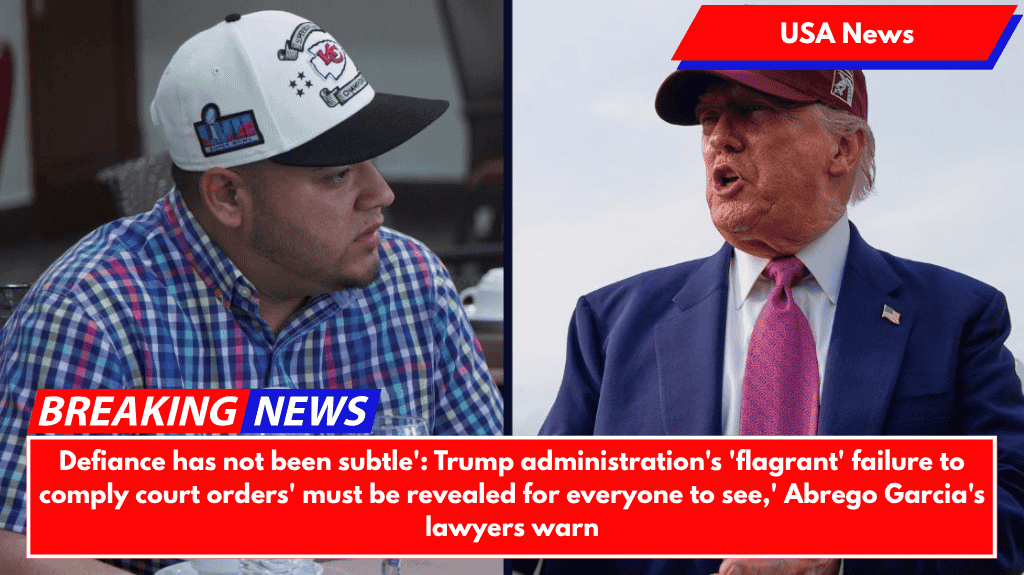Lawyers for Kilmar Abrego Garcia, the Maryland man who was “wrongfully” deported to El Salvador before being returned last week, are requesting that a federal court sanction and investigate the Trump administration for its “defiance” of court orders regarding his return.
In a scathing 33-page late Wednesday filing, the deportee’s lawyers chastised the federal government for its “delays and obfuscation,” claiming that its actions “prejudiced” Abrego Garcia and left him “with no recourse.”
According to them, the administration, or at least some relevant officials, “did not just refuse to obey the Court’s orders, but willfully sought to impede the discovery process” — a precedent that could be dangerous in future cases.
Based on Abrego Garcia’s request for discovery sanctions:
The Government’s defiance has not been subtle. It has been vocal and sustained and flagrant. The Defendants’ defiance of judicial orders has been accompanied by misrepresentations, stonewalling, and even questioning of this Court’s authority. The Defendants’ defiance of this Court’s discovery orders, in particular, has been egregious, defined by open refusal to produce any evidence of its professed compliance and the meritless assertion of an array of purported privileges to shield its actions from scrutiny.
Abrego Garcia was brought back to the United States from El Salvador on Friday. His unexpected return came after months of legal disagreements and public feuding between U.S. lawmakers and officials over his deportation, which the administration admitted was due to a “administrative error,” shedding light on the administration’s deportation policy.
Upon arrival in Tennessee, he was charged in federal court with two counts of illegally transporting undocumented migrants into the country.
U.S. District Judge Paula Xinis directed federal officials to “facilitate” the Maryland man’s return from El Salvador, a country to which an immigration judge in 2019 ruled he could not be deported due to his stated fear of persecution.
The definition of “facilitate” was contested — and even taken to the Supreme Court — with the administration claiming it lacked the authority to return the deportee and questioning the Maryland federal judge’s jurisdiction to issue such an order.
Wednesday’s filing criticized the government’s questioning of the court’s authority and alleged failure to provide answers.
“While the Government—not Plaintiffs—bears the ultimate burden to establish its compliance with this Court’s order to facilitate return and has failed to do so, its failure to timely produce relevant information in response to Plaintiffs’ discovery requests allows the Government to present a cherry-picked record of compliance,” Abrego Garcia’s lawyers wrote, adding that “there is a clear and pressing need to deter the Government and other litigants from engaging in
The lawyers continued, “The lengths the Government has gone to resist discovery relating to these core questions raises a strong inference that the Government is attempting to conceal its conduct from the scrutiny of this Court, the Plaintiffs, and the public. What the government is improperly attempting to conceal must be exposed for all to see.”
U.S. Justice Department attorneys have argued that they followed the court order to return Abrego Garcia, but his lawyers see the months-long legal battle as “willful noncompliance” — either by the administration as a whole or by specific actors, such as Homeland Security General Counsel Joseph Mazzara, whom they believe may have lied.
As a result, Abrego Garcia’s attorneys are requesting that the court impose sanctions on the administration “for their flagrant, repeated violations of this Court’s discovery orders,” as well as “compel the production of previously withheld documents” or appoint a special master to investigate the extent of the alleged noncompliance.
They made a point of arguing for harsh sanctions because the government “repeatedly thumbed its nose at Plaintiffs and this Court in court filings, hearings, and public statements to the media.” They propose sanctions ranging from fines and civil contempt to default judgment.
Earlier this week, Abrego Garcia’s lawyers requested that he be released from jail before his trial on human trafficking charges. Though not in this case, federal prosecutors have accused him of belonging to the MS-13 gang, which he denies, as well as other crimes such as trafficking guns and drugs into the United States.
He remains in federal custody in Tennessee. U.S. Magistrate Judge Sarah Holmes scheduled a hearing for Friday to determine whether Abrego Garcia should be detained while awaiting trial.












